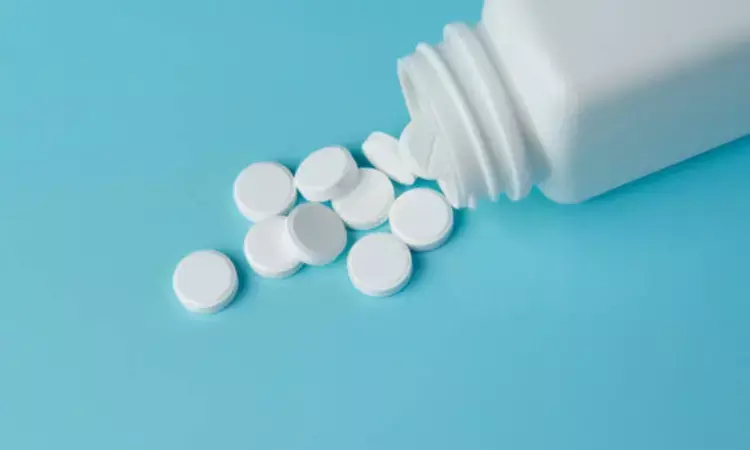- Home
- Medical news & Guidelines
- Anesthesiology
- Cardiology and CTVS
- Critical Care
- Dentistry
- Dermatology
- Diabetes and Endocrinology
- ENT
- Gastroenterology
- Medicine
- Nephrology
- Neurology
- Obstretics-Gynaecology
- Oncology
- Ophthalmology
- Orthopaedics
- Pediatrics-Neonatology
- Psychiatry
- Pulmonology
- Radiology
- Surgery
- Urology
- Laboratory Medicine
- Diet
- Nursing
- Paramedical
- Physiotherapy
- Health news
- Fact Check
- Bone Health Fact Check
- Brain Health Fact Check
- Cancer Related Fact Check
- Child Care Fact Check
- Dental and oral health fact check
- Diabetes and metabolic health fact check
- Diet and Nutrition Fact Check
- Eye and ENT Care Fact Check
- Fitness fact check
- Gut health fact check
- Heart health fact check
- Kidney health fact check
- Medical education fact check
- Men's health fact check
- Respiratory fact check
- Skin and hair care fact check
- Vaccine and Immunization fact check
- Women's health fact check
- AYUSH
- State News
- Andaman and Nicobar Islands
- Andhra Pradesh
- Arunachal Pradesh
- Assam
- Bihar
- Chandigarh
- Chattisgarh
- Dadra and Nagar Haveli
- Daman and Diu
- Delhi
- Goa
- Gujarat
- Haryana
- Himachal Pradesh
- Jammu & Kashmir
- Jharkhand
- Karnataka
- Kerala
- Ladakh
- Lakshadweep
- Madhya Pradesh
- Maharashtra
- Manipur
- Meghalaya
- Mizoram
- Nagaland
- Odisha
- Puducherry
- Punjab
- Rajasthan
- Sikkim
- Tamil Nadu
- Telangana
- Tripura
- Uttar Pradesh
- Uttrakhand
- West Bengal
- Medical Education
- Industry
Perioperative aspirin safe during robotic partial nephrectomy: Study

Perioperative aspirin is safe during robotic partial nephrectomy (RPN), according to a new study.However more studies are needed to clarify the role of perioperative aspirin in robotic partial nephrectomy (RPN).
The study has been published in the Journal of Urology.
Daily aspirin use following cardiovascular intervention is commonplace and creates concern regarding bleeding risk in patients undergoing surgery. Despite its cardio-protective role, aspirin is often discontinued 5–7 days prior to major surgery due to bleeding concerns. Single institution studies have investigated perioperative outcomes of aspirin use in robotic partial nephrectomy (RPN). We sought to evaluate the outcomes of perioperative aspirin (pASA) use during RPN in a multicenter setting.
The researchers performed a retrospective evaluation of patients undergoing RPN at 5 high volume RPN institutions. We compared perioperative outcomes of patients taking perioperative aspirin (pASA) (81 mg) to those, not on aspirin. They analyzed the association between perioperative aspirin (pASA) use and perioperative transfusion.
The Results of the study are:
Of 1,565 patients undergoing RPN, 228 (14.5%) patients continued perioperative aspirin (pASA) and were older (62.8 vs 56.8 years, p <0.001) with higher Charlson scores (mean 3 vs 2, p <0.001). Pperioperative aspirin (pASA) was associated with increased perioperative blood transfusions (11% vs 4%, p <0.001) and major complications (10% vs 3%, p <0.001). On multivariable analysis, perioperative aspirin (pASA) was associated with increased transfusion risk (OR 1.94, 1.10–3.45, 95% CI).
Thus, the researchers concluded that in experienced hands, perioperative aspirin 81 mg use during RPN is reasonable and safe; however, there is a higher risk of blood transfusions and major complications. Future studies are needed to clarify the role of antiplatelet therapy in RPN patients requiring perioperative aspirin (pASA) for primary or secondary prevention of cardiovascular events.
Reference:
Perioperative Aspirin Use Is Associated with Bleeding Complications during Robotic Partial Nephrectomy by Joan C. Delto et al. published in the Journal of Urology.
Dr. Shravani Dali has completed her BDS from Pravara institute of medical sciences, loni. Following which she extensively worked in the healthcare sector for 2+ years. She has been actively involved in writing blogs in field of health and wellness. Currently she is pursuing her Masters of public health-health administration from Tata institute of social sciences. She can be contacted at editorial@medicaldialogues.in.
Dr Kamal Kant Kohli-MBBS, DTCD- a chest specialist with more than 30 years of practice and a flair for writing clinical articles, Dr Kamal Kant Kohli joined Medical Dialogues as a Chief Editor of Medical News. Besides writing articles, as an editor, he proofreads and verifies all the medical content published on Medical Dialogues including those coming from journals, studies,medical conferences,guidelines etc. Email: drkohli@medicaldialogues.in. Contact no. 011-43720751


